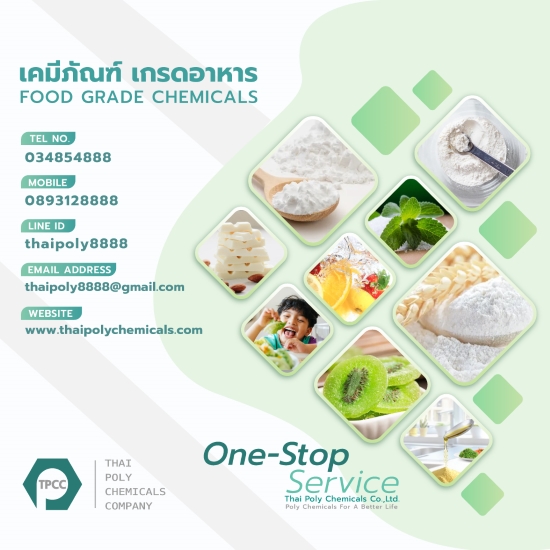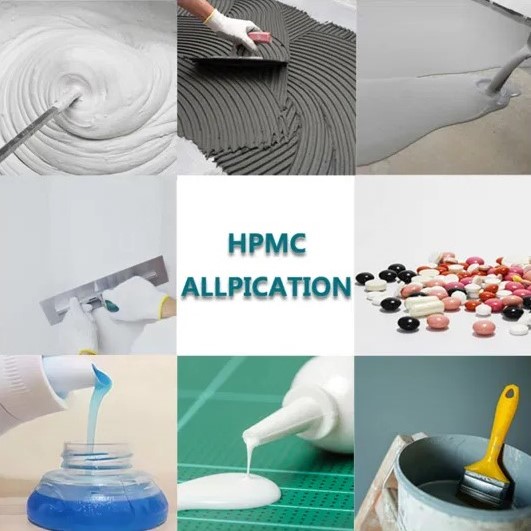ไฮดรอกซีโพรพิลเมทิลเซลลูโลส, Hydroxy Propyl Methyl Cellulose, เอชพีเอ็มซี, HPMC, เกรดยา, USP Grade
สามารถสอบถาม ข้อมูลสินค้าเพิ่มเติม และสั่งซื้อสินค้าได้ที่
บริษัท ไทยโพลีเคมิคอล จำกัด
Thai Poly Chemicals Company Limited
Tel: 034496284, 034854888
Mobile: 0800160016, 0893128888
Line ID: thaipoly8888
Email: thaipoly8888@gmail.com
Web:
www.thaipolychemicals.comCCHPMC02092024
คำค้นหา, Keyword
ไฮโปรเมลโลส, เอชพีเอ็มซี, ไฮดรอกซีโพรพิลเมทิลเซลลูโลส, วัตถุเจือปนอาหาร, เกรดอาหาร, เกรดยา, เกรดยูเอสพี, เกรดเอ็นเอฟ, Hypromellose, Hydroxypropyl methylcellulose, hydroxypropyl methyl cellulose, HPMC, Food Grade, Food Additive, E464, Pharma Grade, Pharmaceutical Grade, USP grade, NF Grade
ข้อมูลผลิตภัณฑ์ ไฮโปรเมลโลส
ไฮโปรเมลโลส (Hypromellose) ย่อมาจาก ไฮดรอกซีโพรพิลเมทิลเซลลูโลส (Hydroxy Propyl Methyl Cellulose) หรือมีชื่อย่อว่า เอชพีเอ็มซี (HPMC) เป็นพอลิเมอร์กึ่งสังเคราะห์ เฉื่อย หนืด เป็นสารที่ใช้ในการผลิตยาหยอดตา ตลอดจนส่วนประกอบเพิ่มปริมาณ และควบคุมการคุณสมบัติในยารับประทาน และยังสามารถพบได้ในผลิตภัณฑ์เชิงพาณิชย์หลากหลายประเภท ในอุตสาหกรรมอาหาร ไฮโปรเมลโลส เป็นสารเติมแต่งอาหาร เป็นอีมัลซิไฟเออร์ เป็นสารเพิ่มความหนืด และเป็นวัตถุดิบทางเลือก แทนเจลาตินสัตว์ รหัสที่ใช้บ่งชี้วัตถุเจือปนอาหารที่ใช้ในสหภาพยุโรป ของไฮโปรเมลโลส คือ E464
ข้อมูลทางเคมี ไฮโปรเมลโลส
ไฮโปรเมลโลส เป็นของแข็ง และมีสีขาวนวลเล็กน้อย ถึงเป็นผงสีเบส และอาจก่อตัวเป็นเม็ด สารประกอบนี้ก่อตัวเป็นคอลลอยด์เมื่อละลายในน้ำ ไฮโปรเมลโลส ไม่ใช่สารที่มีพิษ แต่สามารถติดไฟได้ ประโยชน์เชิงอุตสาหกรรมของไฮโปรเมลโลส ได้แก่ ใช้เป็นส่วนผสมของ กาวติดกระเบื้อง ซีเมนต์ ยิปซัม สี และสารเคลือบเงา ใช้กับอุตสาหกรรมอาหาร เครื่องสำอาง น้ำยา ผลิตภัณฑ์ซักล้าง ทำความสะอาด, และใช้เป็นส่วนประกอบหลักของเภสัชผลิตภัณฑ์ ประเภทยาหยอดตา ที่เพิ่มความหล่อลื่นให้กับตา รวมถึงเป็นสารช่วยในสูตรตำรับของยาชนิดอื่นๆ เช่น ใช้ผสมในยาเม็ด หรือยาแคปซูลชนิดรับประทาน, โดยทำหน้าที่เหมือนกาวที่ยึดเกาะผงยา เป็นผลให้การตอกอัดเม็ดทำได้ง่ายขึ้น, หรือทำให้การปลดปล่อยของตัวยาในระบบทางเดินอาหารเป็นไปอย่างช้าๆ หรือที่เราเรียกสูตรตำรับว่า ‘ยาออกฤทธิ์เนิ่น ยาออกฤทธิ์ได้นาน (Sustained release)
การใช้ประโยชน์ ไฮโปรเมลโลส
กาวติดกระเบื้อง
ปูนซีเมนต์
ผลิตภัณฑ์ยิปซัม
เภสัชกรรม
สีและสารเคลือบ
อาหาร
เครื่องสำอาง
ผงซักฟอก
น้ำยาทำความสะอาด
ยาหยอดตา
เป็นต้น
ข้อมูลเพิ่มเติมเกี่ยวกับ ไฮโปรเมลโลส สามารถสอบถามข้อมูลได้ที่
บริษัท ไทยโพลีเคมิคอล จำกัด
โทร 034496284, 034854888
มือถือ 0800160016, 0893128888
ไลน์ไอดี thaipoly8888
อีเมลล์ thaipoly8888@gmail.com
เว็บไซต์
www.thaipolychemicals.comHypromellose
Hypromellose (INN), short for hydroxypropyl methylcellulose (HPMC), is a semisynthetic, inert, viscoelastic polymer used in eye drops, as well as an excipient and controlled-delivery component in oral medicaments, found in a variety of commercial products. As a food additive, Hypromellose is an emulsifier, thickening and suspending agent, and an alternative to animal gelatin. Its Codex Alimentarius code (E number) is E464.
Chemistry of Hypromellose
Hypromellose is a solid, and is a slightly off-white to beige powder in appearance and may be formed into granules. The compound forms colloids when dissolved in water. This non-toxic ingredient is combustible and can react vigorously with oxidizing agents. Hypromellose in an aqueous solution, like methylcellulose, exhibits a thermal gelation property. That is, when the solution heats up to a critical temperature, the solution congeals into a non-flowable but semi-flexible mass. Typically, this critical (congealing) temperature is inversely related to both the solution concentration of HPMC and the concentration of the methoxy group within the HPMC molecule (which in turn depends on both the degree of substitution of the methoxy group and the molar substitution). That is, the higher the concentration of the methoxy group, the lower the critical temperature. The inflexibility, viscosity of the resulting mass, however, is directly related to the concentration of the methoxy group (the higher the concentration is, the more viscous or less flexible the resulting mass is)
Uses, there are many fields of application for Hypromellose, including
Tile adhesives
Cement renders
Gypsum products
Pharmaceutical
Paints and coatings
Food
Cosmetics
Detergents and cleaners
Eye drops
Contact lenses
Polyvinyl Chloride (PVC)
Et cetera
Use in whole grain breads
Agricultural Research Service scientists are investigating using the plant-derived HPMC as a substitute for gluten in making all-oat and other grain breads. Gluten, which is present in wheat, rye, and barley, is absent (or present only in trace quantities) in oat and other grains. Like gluten, HPMC can trap air bubbles formed by the yeast in bread dough, causing the bread to rise.
Use in construction materials
HPMC is used primarily in construction materials like tile adhesives and renders where it is used as a rheology modifier and water retention agent. Functionally HPMC is very similar to HEMC (hydroxy ethyl methyl cellulose) Trade names include Methocel and Walocel
Ophthalmic applications
Hypromellose solutions were patented as a semisynthetic substitute for tear-film. Its molecular structure is predicated upon a base celluloid compound that is highly water-soluble. Post-application, celluloid attributes of good water solubility reportedly aid in visual clarity. When applied, a Hypromellose solution acts to swell and absorb water, thereby expanding the thickness of the tear-film. Hypromellose augmentation therefore results in extended lubricant time presence on the cornea, which theoretically results in decreased eye irritation, especially in dry climates, home, or work environments. On a molecular level, this polymer contains beta-linked D-glucose units that remain metabolically intact for days to weeks. On a manufacturing note, since Hypromellose is a vegetarian substitute for gelatin, it is slightly more expensive to produce due to semisynthetic manufacturing processes. Aside from its widespread commercial and retail availability over the counter in a variety of products, Hypromellose 2% solution has been documented to be used during surgery to aid in corneal protection and during orbital surgery.
Excipient, tableting ingredient
In addition to its use in ophthalmic liquids, Hypromellose has been used as an excipient in oral tablet and capsule formulations, where, depending on the grade, it functions as controlled release agent to delay the release of a medicinal compound into the digestive tract. It is also used as a binder and as a component of tablet coatings.
More information of Hypromellose, please directly contact
Thai Poly Chemicals Company Limited (TPCC)
Tel: 034496284, 034854888
Mobile: 0800160016, 0893128888
Line ID: thaipoly8888
Email: thaipoly8888@gmail.com
Web:
www.thaipolychemicals.com
